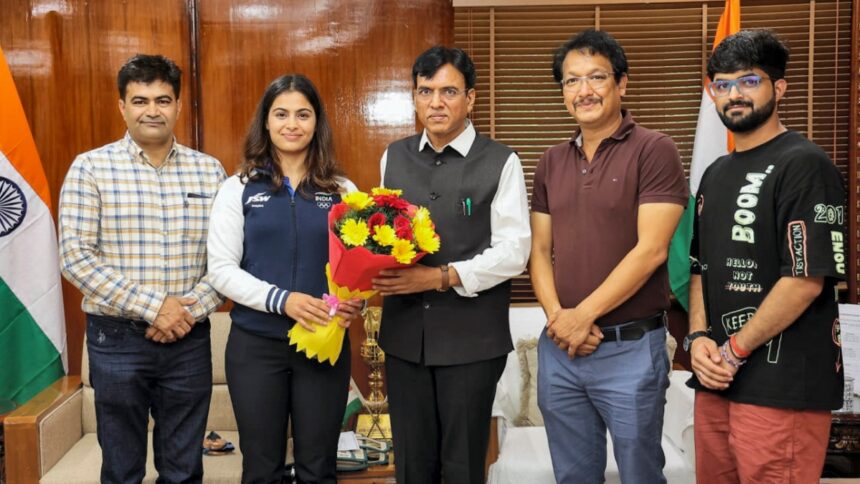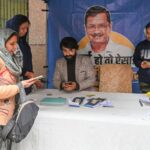Manu Bhaker’s Exclusion from the Major Dhyan Chand Khel Ratna Award: A Deeper Look
Recently, the Indian sports community has stirred with controversy following the omission of Manu Bhaker, a two-time Olympic medallist, from the shortlist for the prestigious Major Dhyan Chand Khel Ratna award, India’s highest sporting honor. This decision has not only sparked outrage among fans and sports enthusiasts but has also prompted significant backlash from Bhaker’s family, particularly her father, Ram Kishan Bhaker, who has expressed deep disappointment over the treatment of athletes in Indian sports.
The Background
Manu Bhaker made history by becoming the first Indian female shooter to clinch gold medals in both the ISSF World Cup and the Commonwealth Games in a single edition of the Olympics. Her achievements ought to have solidified her position among India’s elite athletes, yet her exclusion from the Khel Ratna shortlist has led to questions regarding the selection process and the criteria used by authorities.
Initially, the sports ministry indicated that Bhaker had not applied for the award; however, this claim was later contradicted by the acknowledgment that the list was not final and that Bhaker could still be considered. The evolving narratives surrounding her exclusion have left many to speculate about deeper systemic issues affecting athletes in India.
Ram Kishan Bhaker’s Response
In a candid conversation with the media, Ram Kishan Bhaker conveyed his discontent with the current state of Indian sports. He recounted a conversation with Manu, where she expressed regret over her Olympic pursuits, stating, "I shouldn’t have gone to the Olympics and won medals for the country. In fact, I shouldn’t have become a sportsperson." This sentiment resonated with many who have perceived a lack of support and recognition for athletes outside of high-profile sports such as cricket.
Ram Kishan’s comments were particularly poignant as he urged other parents to reconsider encouraging their children to pursue sports. He suggested that without proper recognition and support, aspiring athletes are often left disillusioned: “As a parent, I would like to tell other parents not to get their kids into Olympic sports; instead, get them educated. When they become IAS or IPS officers, they will have control over many players regarding who should receive the Khel Ratna.”
Bhaker’s Professional Statement
Amidst the turmoil, Manu Bhaker issued a statement expressing her understanding of the significance of awards in enhancing an athlete’s morale, yet reaffirmed her commitment to her sport and country. She acknowledged a potential lapse on her part in the nomination process, and stated, “Irrespective of the award, I shall remain motivated to win more medals for my country."
Bhaker’s response shed light on the professional mindset athletes must uphold, even in the face of disappointment. Her determination to continue contributing to Indian sports, regardless of recognition, is a testament to her character.
Wider Ramifications and Future Prospects
The uproar surrounding Bhaker’s exclusion reflects broader issues within Indian sports, notably the inadequate support systems for athletes. While cricket continues to dominate the sporting landscape and receives substantial governmental and commercial support, other sports, including shooting and athletics, often struggle to gain similar recognition. This disparity invites critical discourse on how sporting merit is assessed and rewarded in India.
As calls for Bhaker’s inclusion in the final Khel Ratna list grow louder, comparisons are drawn with Mohammed Shami, a cricketer whose name was added to a list despite prior exclusions based on performance. The hope is that the authorities will acknowledge the exceptional accomplishments of athletes like Bhaker, leading to a more equitable recognition process.
Conclusion
The situation surrounding Manu Bhaker’s omission from the Khel Ratna shortlist serves as a litmus test for the Indian sports ecosystem. As the nation progresses toward hosting the 2036 Olympics, it will be crucial to address these systemic issues to ensure that deserving athletes receive the recognition and support necessary to thrive. Bhaker’s resilience and determination to continue excelling, despite setbacks, stands as an inspiration to many. This incident not only questions the processes in place for recognizing sporting excellence in India but also highlights the urgent need for reform to foster a more inclusive and supportive environment for all athletes. The outcome will impact not just Bhaker, but aspiring athletes across various sports disciplines in the country.










